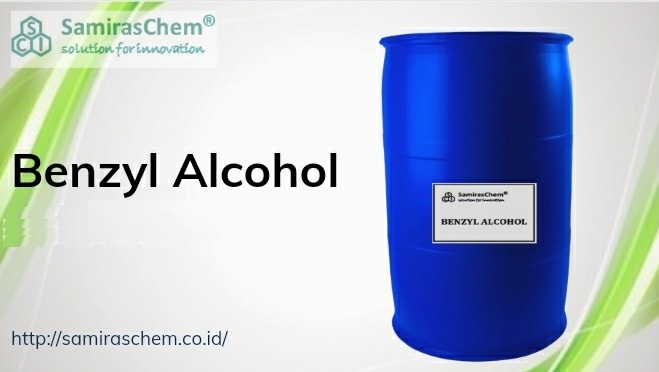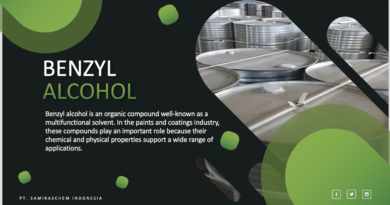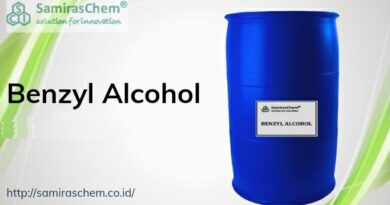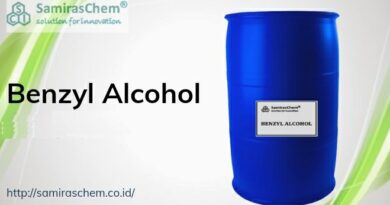Supplier Benzyl Alcohol
Supplier Benzyl alcohol is a colorless, aromatic alcohol that many industries, including the pharmaceutical industry, widely use. Its chemical structure consists of a benzene ring (C6H5) attached to a hydroxymethyl group (-CH2OH). As an important organic compound, benzyl alcohol exhibits a diverse range of properties that make it valuable in pharmaceuticals. Including its solubility, low toxicity, and ability to act as a preservative, solvent, or active ingredient in medicinal formulations. Therefore, it has become indispensable in the formulation of many pharmaceutical products.
Introduction of Supplier Benzyl Alcohol
Benzyl alcohol (C7H8O) appears as a clear, slightly viscous liquid with a mild, pleasant odor reminiscent of jasmine flowers. It has a molecular weight of approximately 108.14 g/mol and a boiling point of 205°C, which makes it suitable for a range of applications that require a stable solvent. One of its key attributes is its relatively low toxicity compared to other alcohols, which makes it an ideal choice in the formulation of various drugs and pharmaceutical products. Furthermore, its relatively high boiling point ensures stability during storage and transportation, making it a versatile choice in pharmaceutical production.
Additionally, benzyl alcohol dissolves in water, alcohol, ether, and acetone, giving it versatility in pharmaceutical applications. This alcohol also behaves as a weak acid, exhibiting an ability to react with bases in certain chemical processes, which can be important in pharmaceutical synthesis. As a result, it serves not only as a solvent but also as a reactant in certain synthetic pathways.
Benzyl Alcohol as a Solvent in Pharmaceuticals
Benzyl alcohol plays an important role as a solvent in the pharmaceutical industry. A solvent is an essential component in drug formulations because it helps dissolve active pharmaceutical ingredients (APIs), thereby facilitating the production of the required concentration of drugs. Without proper solvents, the desired bioavailability and therapeutic effect of many drugs would be impossible to achieve. Solvents like benzyl alcohol help achieve uniform dispersion of APIs within the formulation, ensuring the stability and effectiveness of the final product.
For example, pharmaceutical manufacturers often employ benzyl alcohol in injectable drug formulations. Many biologics or large-molecule drugs, such as monoclonal antibodies, require solvents to dissolve the active ingredients before they can be administered to patients. Benzyl alcohol is particularly useful in these cases because it can dissolve hydrophobic or poorly soluble compounds, making it an effective medium for such formulations. Moreover, it frequently appears in formulations that require rapid absorption or need to maintain a stable concentration over time.
In addition, benzyl alcohol helps prevent precipitation or crystallization of APIs during storage, which is crucial for maintaining the stability and bioavailability of pharmaceutical products. The solvent’s low toxicity ensures that it does not introduce adverse reactions when manufacturers use it in injectable or intravenous formulations. Thus, it serves not only as a solvent but also as a stabilizing agent in these products.
A reputable supplier benzyl alcohol ensures the compound is produced through reliable processes that adhere to Good Manufacturing Practices (GMP). This guarantees that benzyl alcohol remains safe for use in drug formulations and will not introduce harmful impurities into the final product.
Benzyl Alcohol as a Preservative
Another significant use of benzyl alcohol in the pharmaceutical industry is as a preservative. Manufacturers add preservatives to pharmaceutical products. Especially those that are water-based or prepared in bulk, to prevent microbial contamination and extend shelf life. In this regard, benzyl alcohol exhibits antimicrobial properties, making it an effective preservative in many topical and injectable formulations.
Benzyl alcohol’s ability to inhibit the growth of bacteria and fungi proves valuable in preparing pharmaceutical products like eye drops, topical creams, and ointments. It helps reduce the risk of infection or contamination during the usage period of these products, ensuring patient safety. In addition, its ability to act as a mild preservative contributes to the overall stability of the product, ensuring that it remains safe and effective over its shelf life.
One key example of benzyl alcohol’s preservative action appears in its inclusion in certain injectable vaccines. In these products, manufacturers use benzyl alcohol to prevent bacterial contamination while maintaining the integrity of the vaccine during its shelf life. Consequently, benzyl alcohol plays a critical role in maintaining both the safety and efficacy of the vaccine for patients.
Supplier benzyl alcohol often provide detailed specifications and certificates of analysis (COA) to confirm that their products are free from contaminants. And meet the standards set by regulatory bodies such as the U.S. Food and Drug Administration (FDA) and the European Medicines Agency (EMA).
Benzyl Alcohol as an Active Pharmaceutical Ingredient
In some pharmaceutical applications, benzyl alcohol itself functions as an active ingredient (API). For instance, benzyl alcohol appears in certain topical treatments for conditions such as lice infestations. One well-known drug formulation that contains benzyl alcohol is Ulesfia, a prescription treatment for head lice. This formulation uses benzyl alcohol to suffocate and kill lice by disrupting their cell membranes. As an active ingredient, benzyl alcohol plays a dual role in both the therapeutic process and as a carrier or solvent for other ingredients within the formulation.
Furthermore, benzyl alcohol sometimes works in conjunction with other compounds to enhance the overall therapeutic effect. For example, in some anti-itch or anti-inflammatory creams, benzyl alcohol works synergistically with other ingredients to alleviate symptoms such as redness, itching, and swelling. Thus, benzyl alcohol’s versatility in pharmaceutical formulations cannot be overstated, as it contributes to the treatment process in multiple ways.
Suppliers must also provide proper documentation regarding the source and quality of the raw material. Which is critical for maintaining compliance with regulatory guidelines. Thus, selecting a reputable Supplier Benzyl Alcohol is paramount for ensuring the success of pharmaceutical manufacturing processes.
Safety and Toxicology
While benzyl alcohol generally has low toxicity. Pharmaceutical manufacturers must carefully consider its safety profile when using it in drug formulations. The maximum allowable concentration of benzyl alcohol in different pharmaceutical preparations is regulated to ensure patient safety. Consequently, pharmaceutical companies must follow established guidelines to prevent the compound from posing any risks to human health.
In oral and topical preparations, benzyl alcohol has shown safety at low concentrations. However, in high concentrations, it may cause skin irritation or allergic reactions in some individuals. Therefore, pharmaceutical manufacturers need to balance its effectiveness with its potential for causing adverse effects. In parenteral (injectable) formulations, medical professionals pay close attention to the concentration of benzyl alcohol to avoid potential toxicity. Particularly in neonates and infants. High levels of benzyl alcohol exposure in these populations have been linked to “gasping syndrome,” a condition characterized by respiratory distress and metabolic acidosis. Therefore, manufacturers must adhere to strict guidelines regarding the maximum safe concentration of benzyl alcohol in such formulations.
Benzyl alcohol’s toxicity is dose-dependent, meaning that at lower levels, it does not present a significant health risk. However, at very high doses, it can cause CNS (central nervous system) depression, nausea, vomiting, and, in extreme cases, organ damage. Manufacturers minimize toxicity concerns by using benzyl alcohol in carefully controlled amounts in line with established safety standards.
Supplier Benzyl Alcohol in Pharmaceutical Manufacturing
The role of the supplier benzyl alcohol is critical in the pharmaceutical industry. Reliable suppliers ensure that the benzyl alcohol they provide meets the stringent quality and purity standards required for pharmaceutical applications.
Regulatory Considerations
Benzyl alcohol’s use in pharmaceutical products is subject to various regulatory requirements across different regions. In the United States, the FDA evaluates and approves the use of benzyl alcohol in pharmaceutical products. And its concentration in drug formulations is subject to specific limits based on the type of product and intended use. In Europe, the European Medicines Agency (EMA) regulates the use of benzyl alcohol in pharmaceutical products, and similar limits are imposed.
Regulatory bodies require that manufacturers of pharmaceutical products containing benzyl alcohol conduct comprehensive testing to ensure the safety, quality, and efficacy of the final products. This includes both preclinical and clinical studies, as well as ongoing post-market surveillance. Additionally, benzyl alcohol must appear in the list of excipients for any pharmaceutical product. Allowing healthcare providers and regulatory agencies to monitor its usage and potential adverse effects.
Conclusion: The Significance of Supplier Benzyl Alcohol in Pharmaceuticals
In conclusion, benzyl alcohol is a valuable component in the pharmaceutical industry due to its versatility. Low toxicity, and range of functions as a solvent, preservative, and active ingredient. It’s wide use in injectable formulations. Topical treatments, and as a preservative ensures that it remains a crucial compound in the development and manufacturing of pharmaceutical products. Whether manufacturers use it as a solvent for complex biologic drugs or as an antimicrobial agent in topical medications. Benzyl alcohol plays a key role in formulating safe and effective drugs.
The Supplier Benzyl Alcohol plays a central role in ensuring that this compound meets the required purity standards. Delivering a high-quality product to pharmaceutical manufacturers. By adhering to stringent safety and regulatory guidelines. Benzyl alcohol can continue to play a key role in various pharmaceutical applications. Ultimately, benzyl alcohol’s multifunctional properties and relatively low toxicity make it a key component in producing a wide variety of pharmaceutical products, ensuring better health outcomes for patients around the world.
Thus, whether you are developing a new injectable biologic, creating a topical product. Or sourcing preservatives for a vaccine, selecting the right Supplier Benzyl Alcohol is an important consideration in ensuring the quality and safety of pharmaceutical formulations. Through continued advances in formulation technology and a better understanding of benzyl alcohol’s role. Manufacturers will continue to expand and evolve its use in the pharmaceutical industry.






